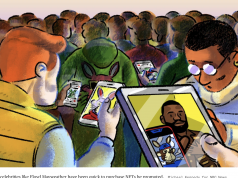Forbes, April 14th, 2022 Brian Jackson
As a kid, I loved collecting sports cards—mostly of hockey and baseball players.
I filled binders with them, and special cards went into their own hard plastic case. Among my prized possessions were a Brett Hull rookie card and a John Olerud card from his first year on the Toronto Blue Jays. You knew they were special because the manufacturer put a hologram sticker on the card, a mark of authenticity that wouldn’t be possible to copy.
When I explain non-fungible tokens (NFTs) to clients, this is the analogy I find works best. (I ask if they ever collected baseball cards first, and luckily so far, the answer has been yes.) Just as the mark of authenticity on that piece of art signaled its scarcity and value as a collector’s item, NFTs are cryptographic signatures that attest to a digital asset’s uniqueness. It contains the provenance of the asset so you can know for certain who previously owned it.
It’s a simple concept that takes advantage of layer 2 blockchain technologies and has blown up during the pandemic, driving market value worth billions of dollars. The pro-sports industry has been one of the most prominent adopters of the technology. Vancouver-based Dapper Labs and the NBA led the charge with NBA Top Shot, showcasing highlight-reel moments of individual players as digital collectibles that hold different rarities and are bought in packs and traded in a marketplace. It was launched in 2020, and its peak was around the spring of 2021 when a LeBron James slam dunk paying homage to the late Kobe Bryant sold for a record $387,600.
Since then, Dapper Labs has expanded its sports partnerships to include UFC and NFL marketplaces. Other sports leagues and individual franchises are launching marketplaces driven by other technology vendors, including MLB, NHL and motorsports.
What real value does NFT technology hold for the sports industry and beyond? Are the tokens and their associated intellectual property destined to be stuck in a binder and collect dust in a basement, as my card collection has? Or is there more to this digital equivalent that’s yet to be tapped?
To answer these questions, let’s look at two different enterprises that are early in the game in launching new business models based on NFT platforms.
Maple Leaf Sports And Entertainment Partnership (MLSE)
What real value does NFT technology hold for the sports industry and beyond? Are the tokens and their associated intellectual property destined to be stuck in a binder and collect dust in a basement, as my card collection has? Or is there more to this digital equivalent that’s yet to be tapped?
To answer these questions, let’s look at two different enterprises that are early in the game in launching new business models based on NFT platforms.
Maple Leaf Sports And Entertainment Partnership (MLSE)









